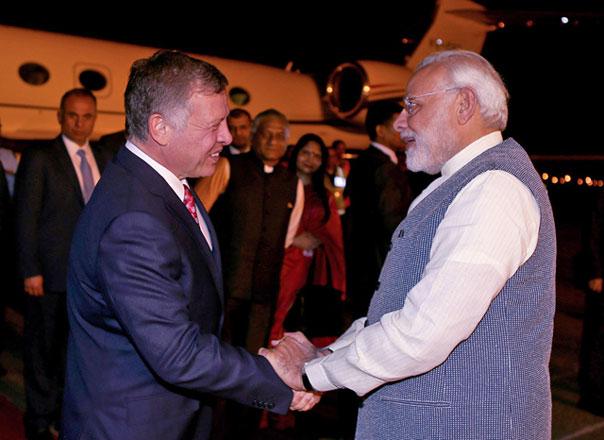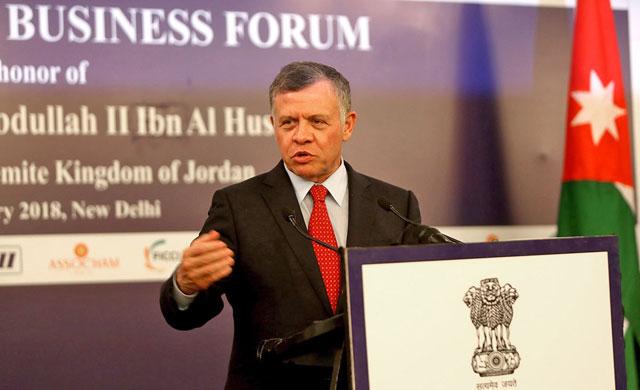You are here
Business leaders see real opportunity created by King’s visits overseas
By Raed Omari - Mar 26,2018 - Last updated at Mar 26,2018
AMMAN — Business leaders on Sunday valued His Majesty King Abdullah's efforts to attract foreign investments to the country and to "open doors" for the Jordanian products into the international market, citing achievements made during His Majesty’s recent visit to The Netherland, following a milestone India visit.
In phone interviews with The Jordan Times, economic sector leaders said that the visits have had "direct" positive outcomes either in form of deals on joint economic ventures already signed between Jordanian businesspeople and their Dutch and Indian counterparts or in form of promised investments in the country "soon".
"The King opens us doors to the international market and to well-established and prestigious world's industries that we need to seize and be ready for," said Basil Al Deek, representative and spokesperson for Jordan Exporters and Producers Organisation for Vegetables and Fruits.
Deek said that a Jordanian delegation of agriculture stakeholders and traders accompanied the King to The Netherlands, where they discussed with their Dutch counterparts ways to utilise the latter's distinguished agricultural expertise.
"With The Netherlands being a leading exporter of agricultural products, we discussed with Dutch producers and traders the possibility that they help market the Jordanian agricultural produces to their worldwide network of importers."
Deek added that talks also covered entering joint agricultural ventures between Jordanian and Dutch farmers.
His organisation, he said, has signed an agreement with the Dutch Centre for Import-Promotion (CBI). “This was one of the direct outcomes of that the King’s visit to The Netherlands.”
CBI is the agency of the ministry of foreign affairs of The Netherlands and part of the development cooperation with the European country’s partners.
Under the agreement, Deek said, the CBI will provide the organisation with exporting services, including markets data and analysis, exhibiting opportunities and training.
“Jordan has great agricultural potentials. During the King’s visit to The Netherlands, we succeeded in arousing the Dutch interest in this industry. It is now up to the Jordanian producers and traders to capitalise on this outcome.”
“The Dutch were very eager to help and they have transformed their pledges into actions,” said Wael Haddadin, owner of Kariem Haddadin Farms.
Haddadin said that the Dutch have put their modern greenhouse technology at the service of Jordan, adding that two Jordanian farmers have already received “giant greenhouses” with half of their price extended by the Dutch government.
“Each greenhouse costs 500,000 euros. The Dutch government pays 250, 000 euros of that.”
Haddadin added that there are already a number of agricultural projects in Jordan either implemented by the Dutch or financed by them, especially in the field of hydroponics or other forms of controlled environments. “But the King’s visit to The Netherlands has expanded the scope of such cooperation and made it more institutionalised and sustainable.”
The Dutch will also help in the water security field.
“The Dutch have future plans for dams in Jordan that they will implement in cooperation with the World Bank,” Haddadin said.
In the presence of King Willem-Alexander of The Netherlands, His Majesty met with business leaders and CEO’s of leading Dutch companies.
During the meeting, His Majesty outlined the opportunities offered by Jordan to foreign investors, highlighting measures taken to improve Jordan’s business environment and attract investments. The King noted that Jordan is seeking to benefit from the Dutch experience and advanced know-how in the fields of agriculture, water management, energy and energy storing solutions.
The meeting covered the investment opportunities that the Jordanian economy provides in several vital sectors, such as renewable energy, infrastructure and transport, in addition to benefitting from the strategic location of the Kingdom and the free trade agreements signed with several countries.
In previous remarks to The Jordan Times, Indian and Jordanian economists underlined the importance of His Majesty’s visit to India earlier this month in enhancing the Amman-New Delhi relations and building joint economic ventures between Jordanian businesspeople and their Indian counterparts.
They also lauded Jordan’s recent decision to provide visas to Indian nationals upon arrival.
During the King’s visit to India, the two countries signed 12 agreements in areas of defence, health and medicine, manpower cooperation. A Memorandum of Understanding was also signed for setting up a next generation centre of excellence (CoE) in Jordan for training of at least 3,000 Jordanian IT professionals over a period of five years, and setting up a resource centre in India for training master trainers in the IT field from Jordan. Other agreements signed include long-term supply of rock phosphate and fertilisers to India.
Economist Yousef Damra, manging editor of the business department at Al Ghad Daily, said that the outcomes of the visits indicate that “there is a genuine opportunity for Jordan to lure investments and penetrate new markets”.
However, he said, success in taking full advantage of the King’s efforts hinges on the country’s ability to remove bureaucratic obstacles, improving the business environment and facilitate the new investments.
Related Articles
AMMAN — His Majesty King Abdullah on Tuesday arrived in New Delhi for a state visit during which he will hold talks with Indian President Ra
AMMAN — His Majesty King Abdullah on Wednesday, in the presence of King Willem-Alexander of The Netherlands, met with business leaders and C
AMMAN — His Majesty King Abdullah on Wednesday attended part of the Jordanian-Indian Business Forum that was held in New Delhi, where he pro















